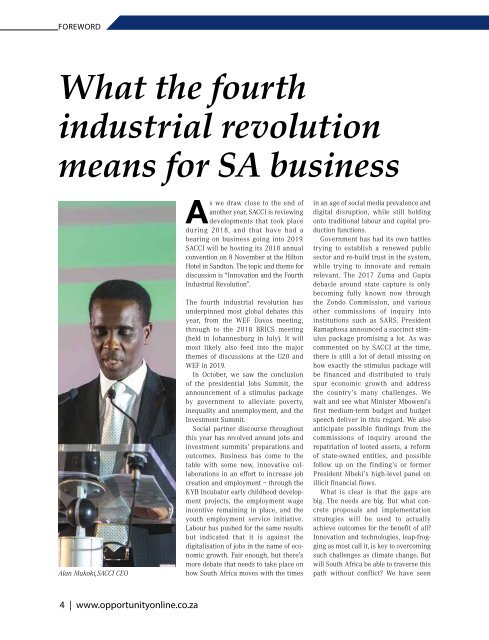Opportunity Issue 88 - Sept-Oct 2018
Create successful ePaper yourself
Turn your PDF publications into a flip-book with our unique Google optimized e-Paper software.
FOREWORD<br />
What the fourth<br />
industrial revolution<br />
means for SA business<br />
Alan Mukoki,SACCI CEO<br />
As we draw close to the end of<br />
another year, SACCI is reviewing<br />
developments that took place<br />
during <strong>2018</strong>, and that have had a<br />
bearing on business going into 2019.<br />
SACCI will be hosting its <strong>2018</strong> annual<br />
convention on 8 November at the Hilton<br />
Hotel in Sandton. The topic and theme for<br />
discussion is “Innovation and the Fourth<br />
Industrial Revolution”.<br />
The fourth industrial revolution has<br />
underpinned most global debates this<br />
year, from the WEF Davos meeting,<br />
through to the <strong>2018</strong> BRICS meeting<br />
(held in Johannesburg in July). It will<br />
most likely also feed into the major<br />
themes of discussions at the G20 and<br />
WEF in 2019.<br />
In <strong>Oct</strong>ober, we saw the conclusion<br />
of the presidential Jobs Summit, the<br />
announcement of a stimulus package<br />
by government to alleviate poverty,<br />
inequality and unemployment, and the<br />
Investment Summit.<br />
Social partner discourse throughout<br />
this year has revolved around jobs and<br />
investment summits’ preparations and<br />
outcomes. Business has come to the<br />
table with some new, innovative collaborations<br />
in an effort to increase job<br />
creation and employment – through the<br />
KYB Incubator early childhood development<br />
projects, the employment wage<br />
incentive remaining in place, and the<br />
youth employment service initiative.<br />
Labour has pushed for the same results<br />
but indicated that it is against the<br />
digitalisation of jobs in the name of economic<br />
growth. Fair enough, but there’s<br />
more debate that needs to take place on<br />
how South Africa moves with the times<br />
in an age of social media prevalence and<br />
digital disruption, while still holding<br />
onto traditional labour and capital production<br />
functions.<br />
Government has had its own battles<br />
trying to establish a renewed public<br />
sector and re-build trust in the system,<br />
while trying to innovate and remain<br />
relevant. The 2017 Zuma and Gupta<br />
debacle around state capture is only<br />
becoming fully known now through<br />
the Zondo Commission, and various<br />
other commissions of inquiry into<br />
institutions such as SARS. President<br />
Ramaphosa announced a succinct stimulus<br />
package promising a lot. As was<br />
commented on by SACCI at the time,<br />
there is still a lot of detail missing on<br />
how exactly the stimulus package will<br />
be financed and distributed to truly<br />
spur economic growth and address<br />
the country’s many challenges. We<br />
wait and see what Minister Mboweni’s<br />
first medium-term budget and budget<br />
speech deliver in this regard. We also<br />
anticipate possible findings from the<br />
commissions of inquiry around the<br />
repatriation of looted assets, a reform<br />
of state-owned entities, and possible<br />
follow up on the finding’s or former<br />
President Mbeki’s high-level panel on<br />
illicit financial flows.<br />
What is clear is that the gaps are<br />
big. The needs are big. But what concrete<br />
proposals and implementation<br />
strategies will be used to actually<br />
achieve outcomes for the benefit of all?<br />
Innovation and technologies, leap-frogging<br />
as most call it, is key to overcoming<br />
such challenges as climate change. But<br />
will South Africa be able to traverse this<br />
path without conflict? We have seen<br />
4 | www.opportunityonline.co.za


















